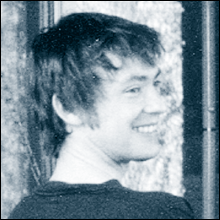![[Sidebar]](/standard/image/sidebar.gif)
![[Music Reviews]](/standard/image/headers/music_reviews_header.gif)
| clubs by night | club directory | bands in town | concerts | hot links | reviews & features |
Musicking
Richard Youngs and Simon Wickham-Smith
by Douglas Wolk
Richard Youngs
There's a wonderful book by Christopher Small called Musicking. Its central idea is that music is a verb rather than a noun -- a process, not a thing. Small argues that "musicking" includes all sorts of musical activity (listening, performing in public, making music solely for oneself), and that its purpose is to honor and explore the ideal relationships among the people involved in that activity. The best performance, he says, depends on "the participants' (that is, both performers and listeners) doing the best they can with what they have." Musicking, then, is everyone's birthright, not (as is generally the case now) a formalized ritual best left to professionals.Back in 1990, two young Englishmen, Richard Youngs and Simon Wickham-Smith, began their collaboration with a recording that comes as close to the spirit of what Small is talking about as anything else I've heard. Credited to R!!!S!!!, Lake was released in an edition of 300 double LPs on their own No Fans label. Freshly reissued on the Virginia label VHF, it's still unlike anything else. At first, it comes off as little more than the documenting of three days of noodling, but its conceptual and sonic range are amazing. Youngs and Wickham-Smith have the enthusiasm of true amateurs who are willing to try anything: four minutes of clock chimes; a mass chant of "The only thing to do with money is to lose it"; a single knotty chord sustained and iterated for almost 20 minutes on reed organ and classical guitar; an actual fuzz-guitar song that crawls like a tank. Even so, they give the impression that they've edited out everything but the memorable parts. In their liner notes to the reissue, they express amazement at having made a double album in three days "with only a friendship to fall back on." Lake, and all the recordings they've made together, say a lot about their friendship -- their comfort with each other, and each's willingness to follow where the other leads.
The old joke about the Velvet Underground is that everyone who heard them started a band. Everyone who heard Lake, it appears, started a label to release the duo's records. Over the last decade, they've released a dozen records and CDs from almost as many record companies. (The roster of tiny labels they've worked with is a kind of poetry in itself: Hell's Half Halo, Forced Exposure, Ignivomous, Fourth Dimension, Opprobrium, Rhizome, Freek.) Their most recent album is 1999's Metallic Sonatas (VHF), a collection of ominous drone instrumentals; the best, besides Lake, is 1997's Red and Blue Bear (VHF), a sort of abstract rock opera for children with very, very long attention spans about a cold bear and a kindly explorer who invites him in to warm up.
Youngs has also made a handful of albums on his own that push the idea of the solo singer/songwriter about as far as it can go. The most recent is the extraordinary Making Paper (Jagjaguwar), which is even more painstaking and gradual than its title suggests. Like 1998's Sapphie (Oblique, reissued on Jagjaguwar), it's a full-length album with three songs on it, this time played on piano instead of Sapphie's guitar. The musicianship is calm, assured, lovely, and entirely unhurried. Each piece explores a little harmonic idea, a motif or two, a slim lyric; it goes on for a while, and then it ends. None of them sticks to a particular time signature or has any sort of familiar formal structure. It's not clear whether Youngs could reproduce them if he wanted to. "The World Is Silence in Your Head" repeats its title as its only lyric; on "Only Haligonian," Youngs's voice drifts in and out of audibility, never getting too close to clarity. He seems to be playing and singing entirely for himself, working out an idea, or simply letting the tunes he's invented play themselves out, the way you'd spend half an hour humming a little snatch of melody that comes to you in the shower after you overheard it by chance.
That's not true, of course: if Youngs were really the only participant in the musicking of Making Paper, he wouldn't have had his frequent collaborator Brian Lavelle record it. The relationship he's addressing here, though, is the stereotypical one between listener and singer/songwriter, where the songwriter expresses his or her feelings in lyrics and we're supposed to understand them and be sympathetic. The act of pre-writing a song, Youngs suggests, is an artifice worth considering; if we're really going to get inside a performer's head by listening to a song, it's going to have to be a song performed at the same time it's composed. Otherwise, it may be no more true than silence.
| home page | what's new | search | about the phoenix | feedback |
Copyright © 2000 The Phoenix Media/Communications Group. All rights reserved.
